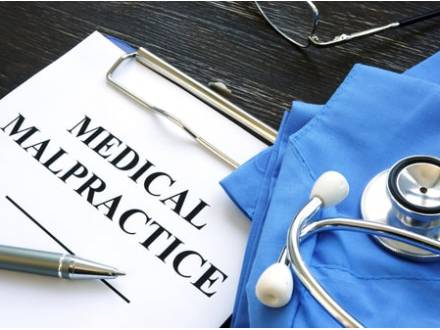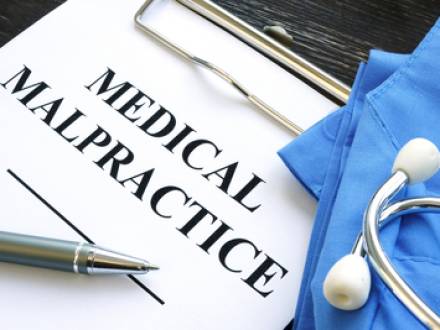Recent Blog Posts
Which Medical Specialties Have the Most Malpractice Suits?
 Anyone can make a mistake. In many cases, those errors do not have severe repercussions. However, when a medical provider makes mistakes, patients can be harmed. General surgeons and obstetricians/gynecologists are the most likely to be sued for medical negligence. In fact, more than 63 percent of physicians in those specialties have had at least one claim filed against them.
Anyone can make a mistake. In many cases, those errors do not have severe repercussions. However, when a medical provider makes mistakes, patients can be harmed. General surgeons and obstetricians/gynecologists are the most likely to be sued for medical negligence. In fact, more than 63 percent of physicians in those specialties have had at least one claim filed against them.
Not every kind of adverse patient event results from medical malpractice. If you suffered harm from a preventable medical error, our skilled Cook County, IL medical malpractice attorney can help you get the compensation you deserve.
What Is the Difference Between a Simple Medical Mistake and Medical Negligence?
Not all medical treatments are successful. Sometimes, a medical professional does everything right, but there are still adverse effects. For example, a patient could have an unexpected allergic reaction to a medication that is commonly prescribed for her ailment. A treatment plan that follows care standards might not produce the desired effect. While unfortunate, a simple mistake does not usually indicate medical negligence.
Easter Weekend Crash Deaths Were the Highest in Over a Year
 Three separate Chicago car crashes in a 24-hour period on Easter weekend, 2025, claimed four lives and injured two more. March 12th-13th, 2024, was the last time this occurred in the city. In two of those accidents, drivers apparently lost control of their vehicles. The third, however, was reportedly caused by a driver running a red light and crashing into two other vehicles. Only one person involved in these crashes did not report an injury.
Three separate Chicago car crashes in a 24-hour period on Easter weekend, 2025, claimed four lives and injured two more. March 12th-13th, 2024, was the last time this occurred in the city. In two of those accidents, drivers apparently lost control of their vehicles. The third, however, was reportedly caused by a driver running a red light and crashing into two other vehicles. Only one person involved in these crashes did not report an injury.
When a traffic death occurs, eligible survivors may be able to secure compensation through wrongful death and survival actions. However, you need evidence proving that another party’s negligence is what caused the car accident and the resulting fatality. Our skilled Chicago personal injury attorney can investigate the collision, establish liability, and work to maximize your compensation.
Do Insurance Companies Pay Injury Claims Fairly?
 So, you have been injured in an accident that someone else caused. In a perfect world, you could file a personal injury insurance claim and promptly receive a fair payment that covers all your financial and non-financial losses without any argument. In reality, insurance companies are businesses that focus on their own profitability. To do that, they will likely try to reduce the amount they pay you, or they could deny your claim outright.
So, you have been injured in an accident that someone else caused. In a perfect world, you could file a personal injury insurance claim and promptly receive a fair payment that covers all your financial and non-financial losses without any argument. In reality, insurance companies are businesses that focus on their own profitability. To do that, they will likely try to reduce the amount they pay you, or they could deny your claim outright.
Most insurers are large companies with teams of lawyers. You need an experienced Cook County, IL personal injury lawyer on your side to tip the scales in your favor.
How Do Personal Injury Claims Work?
In most personal injury cases, you need evidence proving that someone else was responsible for causing your injuries and related damages, whether through negligence or an intentional action. For example, negligent driving errors like speeding, tailgating, and failing to yield the right of way often cause accidents that produce injuries and deaths. An intentional act might be an assault. Medical malpractice, nursing home neglect and abuse, and premises liability cases also fall under personal injury, each with different types of negligence or intent.
Who Is Liable If a Stolen Vehicle Causes an Accident?
 The suspect in a Cook County crash that happened on March 19th, 2025, apparently had a busy day. According to police, the suspect began by allegedly stealing a Bedford Park police car, which was later abandoned when the car became disabled. From there, after an alleged carjacking, the suspect obtained a USPS truck. Finally, the postal truck collided with a car in Bridgeview on Roberts Road. A mother and two young children were injured in the crash. As of now, the suspect is reportedly in police custody.
The suspect in a Cook County crash that happened on March 19th, 2025, apparently had a busy day. According to police, the suspect began by allegedly stealing a Bedford Park police car, which was later abandoned when the car became disabled. From there, after an alleged carjacking, the suspect obtained a USPS truck. Finally, the postal truck collided with a car in Bridgeview on Roberts Road. A mother and two young children were injured in the crash. As of now, the suspect is reportedly in police custody.
In 2022, 38,649 vehicles were reported stolen in Illinois, with 28,545 of those thefts in Cook County. 1,655 of Chicago vehicle thefts involved carjacking. The odds are that you have probably driven close to a stolen car in Chicagoland. If a stolen vehicle causes a collision that injures you, your pursuit of compensation will have complications. Our knowledgeable Cook County, IL personal injury lawyer can face these challenges head-on to help you collect the compensation you deserve.
If I Am Injured in a Slip and Fall Accident, Can I Sue?
 Did you know that around 40 million people visit hospital emergency rooms every year due to injuries? Falls are the top cause of these injuries. Although tripping and falling over your own feet usually does not qualify, some slip and falls could make you eligible for compensation through a premises liability claim.
Did you know that around 40 million people visit hospital emergency rooms every year due to injuries? Falls are the top cause of these injuries. Although tripping and falling over your own feet usually does not qualify, some slip and falls could make you eligible for compensation through a premises liability claim.
These cases are often challenging, requiring investigations to gather supporting evidence. You do not have to handle your investigation or claim alone; a skilled Rolling Meadows, IL personal injury attorney can take appropriate action on your behalf.
How Much Is My Truck Accident Claim Worth?
 As of February 19th, 2025, preliminary data for 2024 reveals that 6,673 Illinois traffic accidents involved large trucks. These crashes caused 3,191 injuries and 147 fatalities. A personal injury or wrongful death claim can provide compensation for injured victims or their families after a truck accident, and one of the first questions claimants have is how much their case is worth.
As of February 19th, 2025, preliminary data for 2024 reveals that 6,673 Illinois traffic accidents involved large trucks. These crashes caused 3,191 injuries and 147 fatalities. A personal injury or wrongful death claim can provide compensation for injured victims or their families after a truck accident, and one of the first questions claimants have is how much their case is worth.
It would be great if we could give you an average settlement amount, but no such thing exists. Your Cook County, IL truck accident lawyer has to examine your case’s unique factors carefully before we can tell you how much compensation you should receive. We offer free consultations to assess your eligibility for filing a claim and explain your legal options.
What Kinds of Crashes Cause the Most Severe Injuries?
 In 2022, Illinois saw 298,347 motor vehicle crashes, for an average of 817 per day. Those collisions produced 83,783 injuries and 1,268 fatalities. Every hour, more than nine people were injured. While some accidents are less likely to cause serious injury, some kinds of collisions are typically more dangerous. If someone else is at fault for a car, motorcycle, pedestrian, or truck crash that injures you, you may be entitled to compensation.
In 2022, Illinois saw 298,347 motor vehicle crashes, for an average of 817 per day. Those collisions produced 83,783 injuries and 1,268 fatalities. Every hour, more than nine people were injured. While some accidents are less likely to cause serious injury, some kinds of collisions are typically more dangerous. If someone else is at fault for a car, motorcycle, pedestrian, or truck crash that injures you, you may be entitled to compensation.
What kinds of crashes are more likely to cause severe injuries or fatalities? Will the liable insurance company pay your claim fairly? For your best chance of success, work with an aggressive Cook County, IL personal injury lawyer who has won similar cases.
What Are OSHA’s Fatal Four at Construction Sites?
 Construction is a dangerous occupation, with accidents happening frequently. Four categories of accidents are so deadly that they are called the "Fatal Four." The U.S. Occupational Safety and Health Administration (OSHA) has a plethora of requirements that must be followed to ensure worker safety, but Chicagoland still sees construction accidents that severely injure or kill.
Construction is a dangerous occupation, with accidents happening frequently. Four categories of accidents are so deadly that they are called the "Fatal Four." The U.S. Occupational Safety and Health Administration (OSHA) has a plethora of requirements that must be followed to ensure worker safety, but Chicagoland still sees construction accidents that severely injure or kill.
If you are injured while working at a construction site, you should receive workers’ comp benefits to help with your expenses. In some cases, you might also qualify to bring a personal injury suit. Family members of fatal victims could pursue a wrongful death action. Choosing an experienced Chicago, IL workers’ comp lawyer who also handles personal injury and wrongful death claims can streamline the processes and result in maximum compensation.
Who Is Liable in Winter Chain-Reaction Crashes?
 Winter storms have recently hit Illinois, with ice and snow on roadways creating hazardous travel conditions. On Sunday, January 5th, at least 40 vehicles were involved in a chain-reaction crash on I-70 close to Casey, IL.
Winter storms have recently hit Illinois, with ice and snow on roadways creating hazardous travel conditions. On Sunday, January 5th, at least 40 vehicles were involved in a chain-reaction crash on I-70 close to Casey, IL.
When several vehicles are involved in a pileup, who is liable for paying damages? Do slick roads mean nobody is responsible? Your knowledgeable Rolling Meadows, IL car accident lawyer can investigate your car accident, identify the at-fault parties, and help you get the compensation you deserve.
Do Icy and Snowy Roads Exempt Drivers from Liability if They Cause a Crash?
Once a vehicle begins to slide, bringing it back under control can be challenging. However, drivers are expected to use caution in poor weather and road conditions by reducing speeds, allowing extra space between vehicles, and ensuring their tires have sufficient tread for optimal traction. Although slick road surfaces can contribute to collisions, drivers are ultimately responsible.
Your Guide to Medical Malpractice in Illinois
 When you visit a doctor, hospital, or other healthcare provider, you expect to be provided with a certain standard of care. You entrust your health to these professionals. Anyone can make a mistake, but when your health is at stake, an error can cause significant or irreparable harm. Negligent errors made by medical professionals may give you grounds for a medical malpractice claim if the mistakes cause harm to patients. Working with an experienced Chicago, IL personal injury attorney dramatically increases your chance of winning your case.
When you visit a doctor, hospital, or other healthcare provider, you expect to be provided with a certain standard of care. You entrust your health to these professionals. Anyone can make a mistake, but when your health is at stake, an error can cause significant or irreparable harm. Negligent errors made by medical professionals may give you grounds for a medical malpractice claim if the mistakes cause harm to patients. Working with an experienced Chicago, IL personal injury attorney dramatically increases your chance of winning your case.
What Is Medical Malpractice?
Healthcare providers that fail to meet care standards can directly injure or otherwise harm their patients. This negligence is considered medical malpractice if certain conditions are met:






